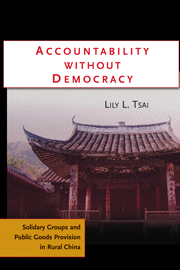Book contents
- Frontmatter
- Contents
- List of Figures
- List of Tables
- Acknowledgments
- 1 GOVERNANCE AND INFORMAL INSTITUTIONS OF ACCOUNTABILITY
- 2 DECENTRALIZATION AND LOCAL GOVERNMENTAL PERFORMANCE
- 3 LOCAL GOVERNMENTAL PERFORMANCE
- 4 INFORMAL ACCOUNTABILITY AND THE STRUCTURE OF SOLIDARY GROUPS
- 5 TEMPLES AND CHURCHES IN RURAL CHINA
- 6 LINEAGES AND LOCAL GOVERNANCE
- 7 ACCOUNTABILITY AND VILLAGE DEMOCRATIC REFORMS
- 8 THE LIMITATIONS OF FORMAL PARTY AND BUREAUCRATIC INSTITUTIONS
- 9 CONCLUSION
- References
- Appendix: Additional Notes on Survey Sampling and Data Analysis
- Index
- Cambridge Studies in Comparative Politics
9 - CONCLUSION
Published online by Cambridge University Press: 05 June 2012
- Frontmatter
- Contents
- List of Figures
- List of Tables
- Acknowledgments
- 1 GOVERNANCE AND INFORMAL INSTITUTIONS OF ACCOUNTABILITY
- 2 DECENTRALIZATION AND LOCAL GOVERNMENTAL PERFORMANCE
- 3 LOCAL GOVERNMENTAL PERFORMANCE
- 4 INFORMAL ACCOUNTABILITY AND THE STRUCTURE OF SOLIDARY GROUPS
- 5 TEMPLES AND CHURCHES IN RURAL CHINA
- 6 LINEAGES AND LOCAL GOVERNANCE
- 7 ACCOUNTABILITY AND VILLAGE DEMOCRATIC REFORMS
- 8 THE LIMITATIONS OF FORMAL PARTY AND BUREAUCRATIC INSTITUTIONS
- 9 CONCLUSION
- References
- Appendix: Additional Notes on Survey Sampling and Data Analysis
- Index
- Cambridge Studies in Comparative Politics
Summary
People everywhere struggle to make sure that government officials provide schools for their children, roads to bring their goods to market, and safe water to drink. Why are some people more successful than others? We have seen in the case of rural China that it is not always because they are richer. Economic growth is not necessarily correlated with better public goods provision and better government. Villages with higher levels of industrialization and economic development do not necessarily provide better roads and schools. Democratic reforms have not been a straightforward solution either. Even officials elected through free and fair procedures may fail to respond to citizens' needs when the rewards of office are low and getting voted out of office is not such a bad prospect.
This book argues that the key to explaining governmental performance and public goods provision when formal democratic and bureaucratic accountability is weak is to look more closely at informal institutions of accountability. When neither democratic institutions (such as elections) nor bureaucratic institutions (such as performance reviews) hold officials accountable for public goods provision, local governance may still be good when social groups enmesh local officials in community obligations. When officials are embedded in solidary groups such as temples or villagewide lineages that encompass everyone under their jurisdiction, obligations they have to contribute to the good of the group are synonymous with obligations to contribute to the public good. Under these conditions, social institutions can reinforce or substitute for state institutions.
- Type
- Chapter
- Information
- Accountability without DemocracySolidary Groups and Public Goods Provision in Rural China, pp. 251 - 270Publisher: Cambridge University PressPrint publication year: 2007

